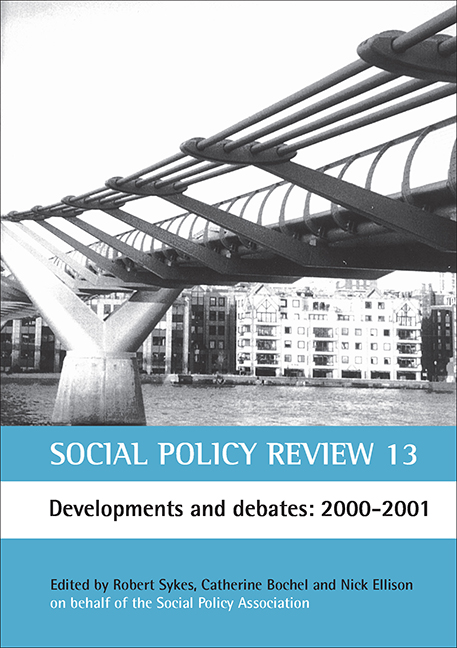twelve - New Labour, human nature and welfare reform
Published online by Cambridge University Press: 20 January 2022
Summary
In recent years the notion of human nature has returned to centre stage of social policy and politics. According to Alan Deacon “the debate about the future of welfare has entered a crucial and extraordinarily interesting phase” characterised by “the prominence accorded … to questions of character, behaviour and morality” (1997, p 131; see Hewitt, 2000). Politicians and academics have shown renewed interest in the importance of theories of human nature and character in public policy. Margaret Thatcher claimed that the success of her policies was based on “clear, firmly held principles which were themselves based on a right understanding of politics, economics and above all human nature” (quoted in Shrimsley, 1996). Critical of this view, Tony Blair (1995) has argued that his politics “draws on a broader and therefore more accurate notion of human nature than one formulated on insular self-interest.” Yet the debate about the importance of self-interest in defining human nature is no longer one between the Right and the Left, but is found at the hub of centre-left politics. Politicians such as Frank Field now argue that self-interest is the most important among the different human motivations that welfare reform should address (1997, p 165). Today, leading politicians use theories of human nature as one of the principal means of justifying policy.
One reason for the renewed interest in human nature is the realisation that the justification for different political values derives from differing and often competing views of human nature. During the postwar decades, the Right saw human nature as driven by the dominant motivation of self-interest, while the Left saw more collective sentiments as dominant. For a free-market thinker like Sir Keith Joseph (1976, pp 59-60), the principal human “motive is not goodwill…. [I]t is enlightened self-interest”, whereby through the market “the self interest of the businessman is harnessed to the interest of his customer by competition”. For a socialist like Titmuss (1970, p 225), a “deep human motive” of altruism resides in human nature such that “the ways in which society organises and structures its social institutions – and particularly its health and welfare systems – can encourage or discourage the altruistic in man”.
- Type
- Chapter
- Information
- Social Policy Review 13Developments and Debates: 2000–2001, pp. 247 - 266Publisher: Bristol University PressPrint publication year: 2001

